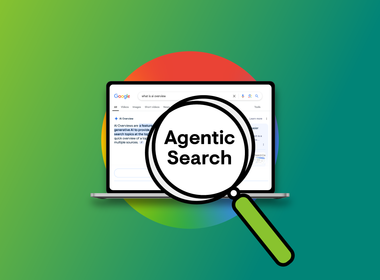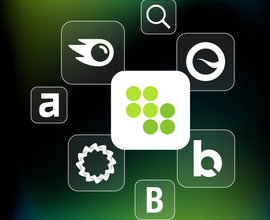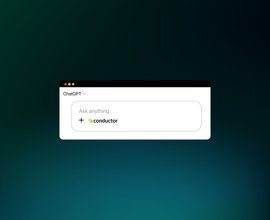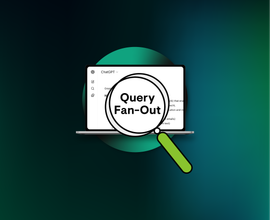What is Agentic Search and Why is it Important for Brands?
Agentic AI and agentic searchAgentic Search
Agentic search is an AI-powered search approach where autonomous agents conduct multi-step research, synthesizing information across multiple sources.
Learn more represent a significant leap beyond the AI models you may be familiar with, promising to redefine how we interact with information, automate complex tasks, and optimize digital experiences. Understanding their core definitions, characteristics, and applications is crucial for anyone looking to maximize visibility, drive conversions, and prove the return on investment (ROI) of their digital efforts.
This article will unpack agentic search, distinguishing them from other AI forms and exploring their implications for the future of digital strategy.
What is agentic search?
Agentic search is a specialized application of agentic AI principles within the realm of information retrieval. It goes far beyond traditional keywordKeyword
A keyword is what users write into a search engine when they want to find something specific.
Learn more matching or even the summarization capabilities of generative search models.
Agentic search actively understands a user's underlying intent, performs iterative queries, synthesizes information from multiple sources, and refines results to achieve a comprehensive answer or solution.
A lot of people sometimes get confused and they think that if a tool does anything leveraging AI, that it's agentic.
But there is a narrower definition of agentic, which is an AI model that is taking actions on a human’s behalf, follows multi-step instructions, keeps memory and context, and tool calling; those are the signature of an agent.
How is agentic search different from AI search?
While all agentic search is a form of AI search, not all AI search is agentic. Stay with me here. The difference is in the level of autonomy, goal orientation, and multi-step reasoning that the model is capable of.
Traditional AI search (or generative AI search): Many current AI search experiences, often powered by LLMs, like ChatGPT , Google’s AI Mode, and Perplexity , excel at:
- Information retrieval: Quickly finding relevant documents or web pages based on keywords and queries.
- Summarization: Condensing large amounts of text into concise answers.
- Direct question answering: Providing immediate responses to factual questions.
- Content generation: Creating text, images, or code based on prompts.
These systems are great at processing and presenting information, but they are largely reactive, responding to a direct prompt or query by drawing from their training data or indexed web content.
For example, if you ask an LLM: "What are the benefits of content marketingContent Marketing
Content marketing is a marketing discipline with the goal of increasing awareness and scope for products and brands in the desired target group with content published on the web and offline.
Learn more?" It will provide a well-summarized answer based on its knowledge and the data it was trained on.
Agentic search takes AI search to the next level. It can leverage all the principles that make something agentic, which are taking action on your behalf, being able to reason, and performing multiple steps.
Typically, if you just ask an LLM to do one task, that's just an LLM search. That's not agentic. Agentic is able to understand a set of goals, it's able to keep memory, perform multiple steps of the function, and do it autonomously without you instructing it exactly what to do. That's what's making it agentic.
Agentic Search: Agentic search, on the other hand, is proactive and goal-driven. It’s designed to tackle problems that require more than a single lookup or a simple summary. An agentic system might:
- Perform multi-step research: Instead of just answering "What are the benefits of content marketing?", an agentic system could be tasked with "Develop a content strategy for a B2B SaaS company targeting enterprise clients, including topic ideas, keyword research, and a distribution plan." This requires understanding the industry, researching competitors, identifying relevant keywords, generating topic clusters, and outlining a distribution strategy.
- Utilize external tools: An agent might use a web scraping tool, a data analysis API, or even a project management system to complete its task.
- Iterate and refine: If the initial content strategy outline is too generic, the agent might identify this, ask clarifying questions, or perform additional research to refine its output.
While some advanced LLMs can show agentic behaviors by interacting with external tools, a truly agentic AI system is built with a deeper emphasis on planning, execution, and autonomous iteration towards a defined goal.
I think people get confused when they hear agentic. They sometimes think agentic search is using ChatGPT, but agentic means there is an agent involved, and it's doing something. For example, let's say you are going to New Orleans and you’re looking for restaurants. You can ask ChatGPT to find restaurants and then give you the website links, but that's just a search, not necessarily agentic.
An example of angentic search would be that there is an AI agent that I asked the same question to, and the agent asks me what restaurants I want to reserve, what times, and then they would go and make the reservation for me.
Why is agentic search important?
The way we find information online has changed significantly in a short time. From the early days of simple keyword matching to the rise of generative AIGenerative AI
Generative AI is a class of AI that creates content like text, images, and code rather than analyzing existing data, powering tools like AI search.
Learn more in search, each evolution has aimed to provide users with more relevant and direct answers.
Agentic search is the next big leap, completely shifting how people search, and that has huge implications for your brand and visibility. Just like the initial shift to AI search, brands need to understand how they are appearing in agentic search experiences and control and amplify it as best they can.
Agentic search operates more like a highly skilled human researcher, breaking down complex information needs into a series of intelligent, adaptive steps:
- User enters complex goal/query: The user articulates a broad objective, such as "Help me plan a comprehensive content strategy for Q4."
- Task decomposition: The agentic AI breaks down this overarching goal into smaller, actionable sub-tasks. For example: "Research Q4 industry trends," "Identify high-potential keywords," "Analyze competitor content," "Generate content ideas," "Create a publishing schedule."
- Dynamic decision-making: For each sub-task, the agentic system intelligently chooses the best tools and strategies. It might decide to use a web crawler for trend analysis, a keyword research tool for topic identification, or a content analysis module for competitor insights.
- Iterative query construction: Based on initial results, the agentic AI refines its queries, asking follow-up questions to itself or external systems. If a keyword search yields too many broad results, it might automatically narrow the scope or add more specific modifiers.
- Integration with multiple data sources: The system seamlessly accesses and combines information from diverse sources—the open web, internal company databases, APIs, real-time market data, and proprietary analytics platforms.
- Synthesis & refinement: It continuously synthesizes the gathered information, identifies gaps in its knowledge, and refines the output. This iterative loop ensures the final answer is comprehensive and accurate.
- Action/Recommendation: The agentic search system doesn't just provide a list of links or a summary. It delivers a comprehensive answer, a detailed plan, or even executes an action, such as populating a content calendar or drafting an initial outline.
How do I appear in agentic search?
The good news is that appearing in agentic search isn’t all that different from what you need to do to appear in traditional search and AI search experiences. The central goal is to create content that is valuable, unique, and relevant to your target audience.
Here are a few ways that teams can set their site up for success in agentic search.
- Prioritize high-quality, authoritative content
- Improve your expertise and topical authority
- Leverage structured data and schema markup
- Optimize for conversational AI and natural language
- Boost your internal linking strategy
- Perform regular content audits and optimizations
- Leverage AI-powered content creation and optimization platforms
- Leverage AI visibility platforms to benchmark your current AI performance
By focusing on these strategic areas, you can position your digital assets to be discovered, understood, and leveraged by the next generation of AI-powered search agents.
Are there risks to leveraging agentic frameworks?
Like any other AI workflow, agentic AI comes with its share of considerations. Potential risks include:
- Resource intensity: Running complex, iterative agentic workflows often uses significant computing resources.
- Ethical concerns: It’s critical to consider issues like bias in underlying data, potential for misuse, and the need for transparency in decision-making.
- "Hallucinations" and errors: While agentic systems aim for accuracy, they are not infallible. Errors can occur, and the complexity of multi-step processes can make debugging challenging.
- Need for oversight: The importance of a "human-in-the-loop" can’t be overstated. Human oversight is essential for setting goals, validating outputs, and intervening when necessary to ensure alignment with business objectives and ethical guidelines.
Agentic AI and search in review
Agentic AI and agentic search aren’t just the latest tweaks to AI power; they represent another shift in what AI is capable of, moving from reactive tools to proactive, goal-oriented partners. Embracing agentic methodologies empowers practitioners to tackle more complex challenges, automate tedious tasks, and unlock new levels of efficiency and insight, which helps brands maximize resources, execute faster, and do more while overseeing less.
FAQs
- What is an AI agent?
- What is a human-in-the-loop AI approach?
- What is AI visibility?
- What is AEO tool sprawl?

![Wei Zheng, Chief Product Officer, [object Object]](https://cdn.sanity.io/images/tkl0o0xu/production/dcfa62c0fe34ba0c31f910b818874cd160ad8839-3542x3542.png?fit=min&w=100&h=100&dpr=1&q=95)
![Patrick Reinhart, VP, Services and Thought Leadership, [object Object]](https://cdn.sanity.io/images/tkl0o0xu/production/9bc72298b24ad01b732de4c3376f79546d20f81c-3542x3542.png?fit=min&w=100&h=100&dpr=1&q=95)






